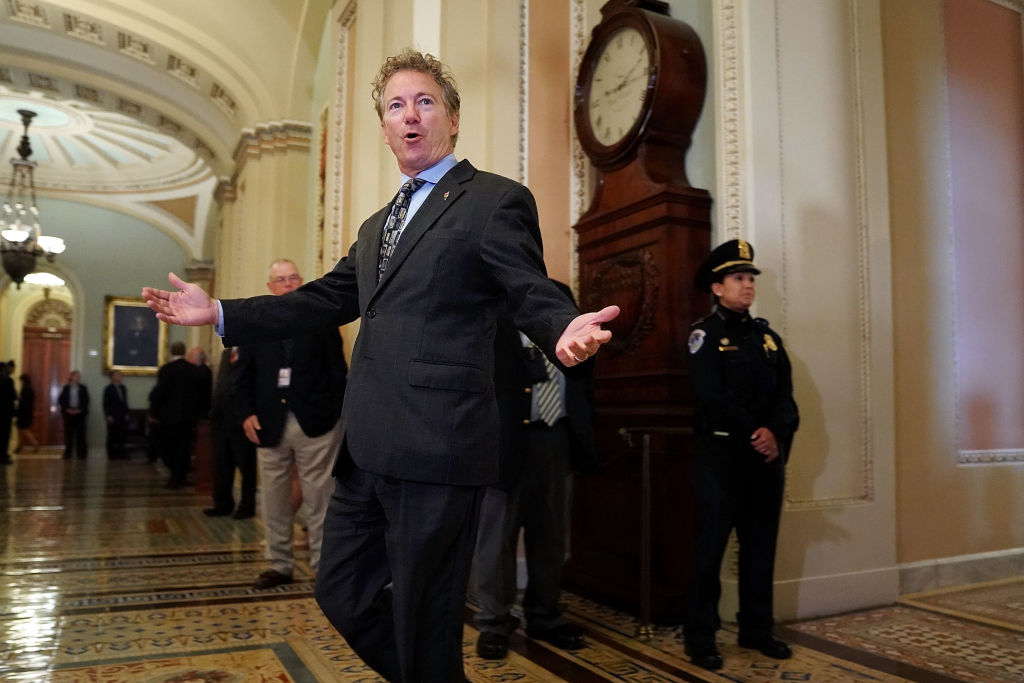Against all odds, Rand Paul is once again the most interesting man in politics. When TIME first called him that in 2014, the Kentucky senator looked to be a serious presidential contender. Now he’s become President Trump’s unlikeliest alter ego — a Republican who can say and do many of the same things the president likes to say and do, but with greater ideological focus and discipline. Nowhere is this more apparent than in foreign policy, where the senator has both the institutional independence and the philosophical self-assurance to fight battles that the president’s advisers don’t want Trump himself to fight.
Russia is a case in point. Trump faced relentless criticism for his meeting in Helsinki with Vladimir Putin in July, and plans to host the Russian leader in the U.S. this fall soon fell through. Whatever the president’s own feelings, his team in the White House was not looking to keep the headlines coming on this story. But even as the president was under siege, with Republicans joining the chorus of criticism, Senator Paul was preparing a visit of his own Russia. He has come back on the offensive — if a plea for diplomatic engagement with the world’s other leading nuclear power can be called ‘offensive’ — even taking the message to the president’s critics in the prestige media by writing an essay on his trip for the Atlantic.
‘I, for one,’ Paul wrote, ‘am thankful that Reagan and Gorbachev defied orthodoxy to cut stockpiles of nuclear weapons and reduce the tension between our countries.’ President Trump, unlike most Republican politicians, does not habitually frame his policies in terms of Ronald Reagan’s legacy. Trump prevailed against his GOP opponents in 2016 precisely by not playing the Republican game—or by any of the ordinary rules of politics in general. But even in the Trump era, there is a place for more conventional politicians who can still play by the old rules. Rand Paul is unique as a Republican who can use the old standbys in new ways: like Trump, he was not a professional politician before winning the office he now holds. But unlike Trump, Paul has had to stick closer to the GOP’s familiar idioms. So he talks about Reagan — but he talks about Reagan as a peacemaker, not a stereotypical Republican hawk. Senator Paul could not do what Trump has done — namely, win the presidency — but he is able to bridge Trumpism and old-guard Republicanism while pointing both in a more libertarian direction. This is what makes him the most interesting and creative figure in Congress right now.
Paul has actually voted against the president’s wishes more often than such vaunted ‘resistance’ Republicans as fellow senators Jeff Flake or Ben Sasse. But on the points where Paul agrees with Trump — on some of Trump’s most critical concerns, in fact — he is the best ally the president has. That was plain again this week when the Kentucky senator backed up the president’s decision to revoke for CIA director John Brennan’s security clearance. ‘I urged the President to do this,’ Rand Paul announced on his Senate website. ‘I filibustered Brennan’s nomination to head the CIA in 2013, and his behaviour in government and out of it demonstrate why he should not be allowed near classified information. He participated in a shredding of constitutional rights, lied to Congress, and has been monetising and making partisan political use of his clearance since his departure.’
The past two weeks have seen primary elections in which Trump’s control of the Republican Party has been confirmed: the candidate he backed for the Kansas gubernatorial nomination, Kris Kobach, won his close race after a week’s worth of vote-counting, while Trump critic Tim Pawlenty, aiming to return to the governor’s mansion in Minnesota, lost his primary Tuesday. Despite the success of Trump Republicans and the failure of Trump’s foes within the party however, a common refrain in Washington, D.C. is that Trump is failing to institutionalise his movement. Once Trump leaves office, what becomes of the Trump revolution?
Rand Paul has part of the answer. There is a wing of the party, represented by Paul and his modest but loyal network, ready to pick up the mantle of a more restrained Republican foreign policy if no Trump-style America First nationalists are ready to do so in the 2020s. And if Trump-like Republican nationalists are able to institutionalise, or remain a force in politics one way or the other, they will have Paul Republicans by their side to reinforce their aversion to foreign interventionism — and to pressure them to abide by civil liberties and adhere to traditional Republican commitments to shrinking government. There is a case to be made that the libertarian populist campaigns of Senator Paul’s father, Ron Paul, in 2008 and 2012 set the stage for the larger Donald Trump populist insurgency of 2016. Ron Paul revealed just how vulnerable the Republican establishment was to an unexpected alternative in foreign policy and political attitudes in general. Trump hammered on those fault lines with even greater popular force, and by doing so he shattered the party of the Bushes. Rand Paul was right to cite Reagan: as different and unique as President Trump certainly is, he represents a chance to revisit the choices that were made in 1989 after Reagan left office, choices that led America into prolonged wars, the Great Recession, and industrial decline relative to China’s growth. Republicans in the third decade of the 21st century will have to be just as bold as Reagan was — as bold as Rand Paul and Donald Trump are.


















